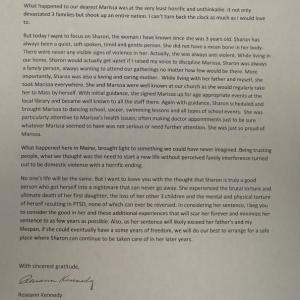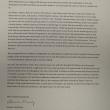UPDATED: Sharon Carrillo gets 48 years for depraved indifference murder of 10-year-old daughter
 Sharon Carrillo prepares to hear the verdict for her murder trial in Waldo County Superior Court on Dec. 18, with Attorney Laura Shaw appearing beside her. (photo by Erica Thoms)
Sharon Carrillo prepares to hear the verdict for her murder trial in Waldo County Superior Court on Dec. 18, with Attorney Laura Shaw appearing beside her. (photo by Erica Thoms)
 Sharon Kennedy (formerly Carrillo) looks back at her family as she is escorted out of the courtroom. (photo by Erica Thoms)
Sharon Kennedy (formerly Carrillo) looks back at her family as she is escorted out of the courtroom. (photo by Erica Thoms)
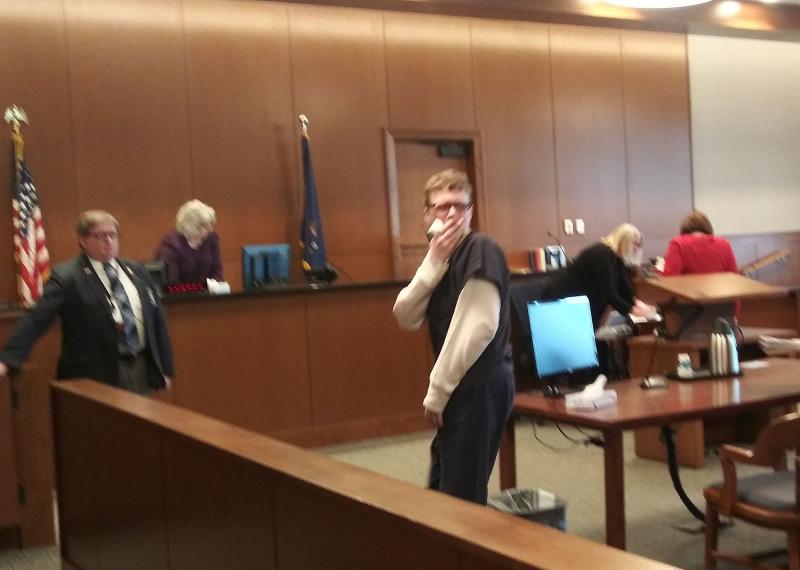 Sharon Kennedy (formerly Carrillo) looks back at her family as she is escorted out of the courtroom. (photo by Erica Thoms)
Sharon Kennedy (formerly Carrillo) looks back at her family as she is escorted out of the courtroom. (photo by Erica Thoms)
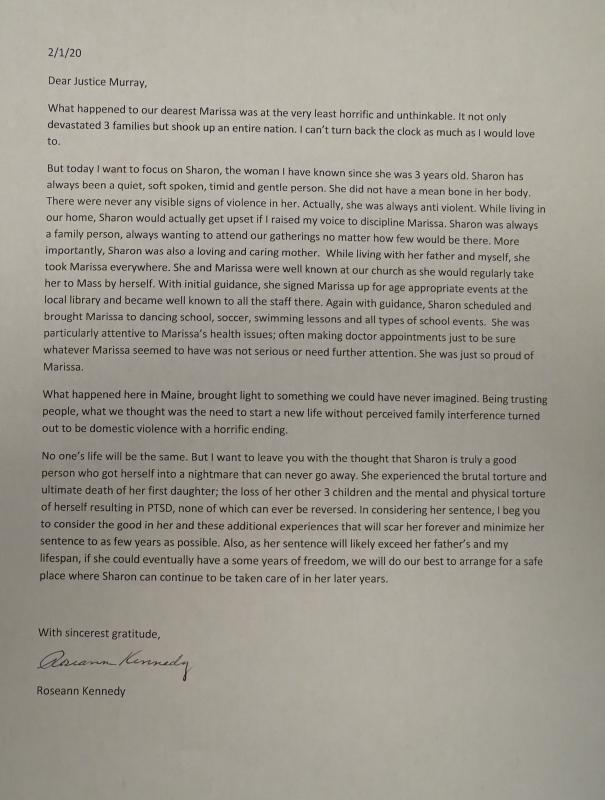 Statements from Sharon’s immediate and extended family were read before the court, with Sharon’s longtime stepmother Roseann Kennedy agreeing to share hers. (photo by Erica Thoms)
Statements from Sharon’s immediate and extended family were read before the court, with Sharon’s longtime stepmother Roseann Kennedy agreeing to share hers. (photo by Erica Thoms)
 Attorney Laura Shaw comforts Sharon during her sentencing. (photo by Erica Thoms)
Attorney Laura Shaw comforts Sharon during her sentencing. (photo by Erica Thoms)
 Laura Shaw speaks with reporters following the hearing. (photo by Erica Thoms)
Laura Shaw speaks with reporters following the hearing. (photo by Erica Thoms)
 Assistant Attorney General Leane Zainea speaks with reporters following the hearing. (photo by Erica Thoms)
Assistant Attorney General Leane Zainea speaks with reporters following the hearing. (photo by Erica Thoms)
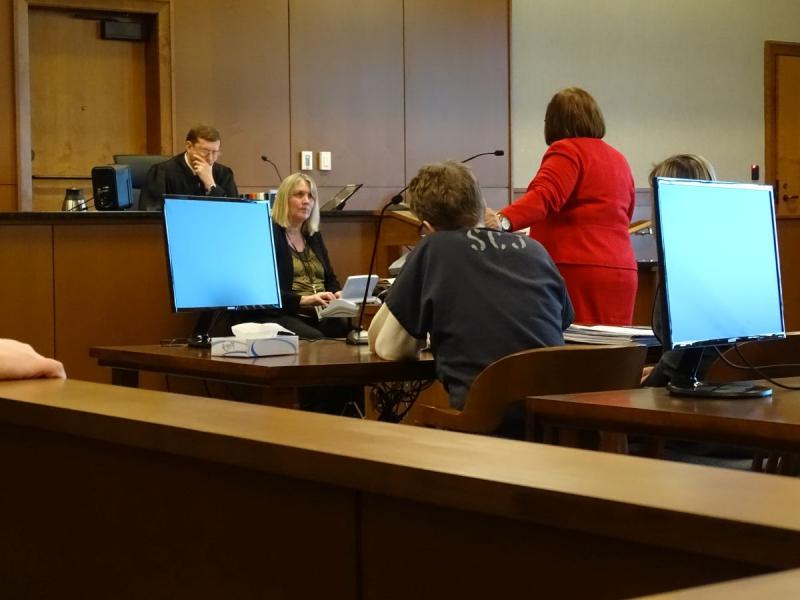 AAG Zainea speaks to Justice Robert Murray. (photo by Erica Thoms)
AAG Zainea speaks to Justice Robert Murray. (photo by Erica Thoms)
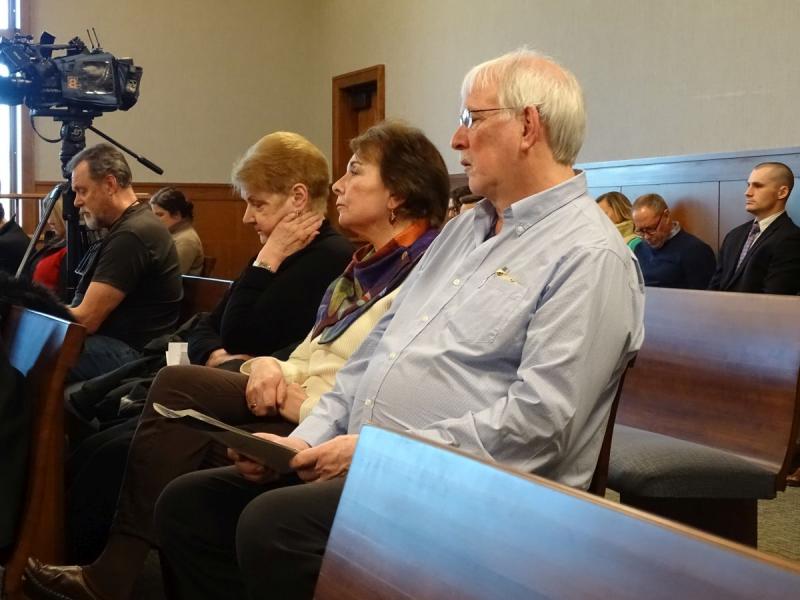 Members of Sharon’s family came to offer their support at the Feb. 21, sentencing. (photo by Erica Thoms)
Members of Sharon’s family came to offer their support at the Feb. 21, sentencing. (photo by Erica Thoms)
 Sharon Carrillo prepares to hear the verdict for her murder trial in Waldo County Superior Court on Dec. 18, with Attorney Laura Shaw appearing beside her. (photo by Erica Thoms)
Sharon Carrillo prepares to hear the verdict for her murder trial in Waldo County Superior Court on Dec. 18, with Attorney Laura Shaw appearing beside her. (photo by Erica Thoms)
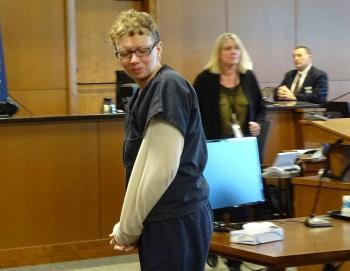 Sharon Kennedy (formerly Carrillo) looks back at her family as she is escorted out of the courtroom. (photo by Erica Thoms)
Sharon Kennedy (formerly Carrillo) looks back at her family as she is escorted out of the courtroom. (photo by Erica Thoms)
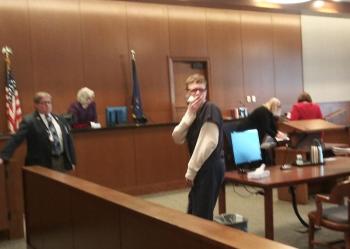 Sharon Kennedy (formerly Carrillo) looks back at her family as she is escorted out of the courtroom. (photo by Erica Thoms)
Sharon Kennedy (formerly Carrillo) looks back at her family as she is escorted out of the courtroom. (photo by Erica Thoms)
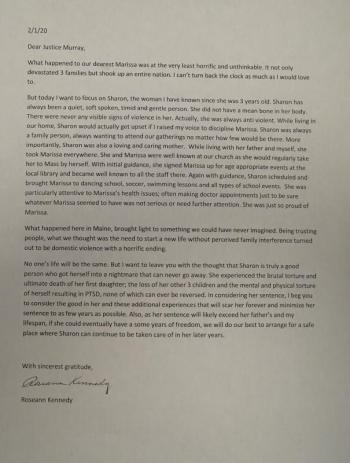 Statements from Sharon’s immediate and extended family were read before the court, with Sharon’s longtime stepmother Roseann Kennedy agreeing to share hers. (photo by Erica Thoms)
Statements from Sharon’s immediate and extended family were read before the court, with Sharon’s longtime stepmother Roseann Kennedy agreeing to share hers. (photo by Erica Thoms)
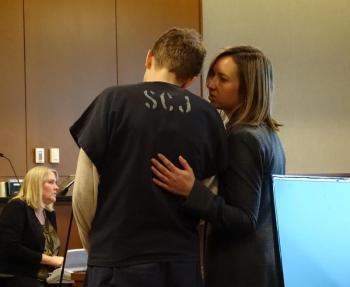 Attorney Laura Shaw comforts Sharon during her sentencing. (photo by Erica Thoms)
Attorney Laura Shaw comforts Sharon during her sentencing. (photo by Erica Thoms)
 Laura Shaw speaks with reporters following the hearing. (photo by Erica Thoms)
Laura Shaw speaks with reporters following the hearing. (photo by Erica Thoms)
 Assistant Attorney General Leane Zainea speaks with reporters following the hearing. (photo by Erica Thoms)
Assistant Attorney General Leane Zainea speaks with reporters following the hearing. (photo by Erica Thoms)
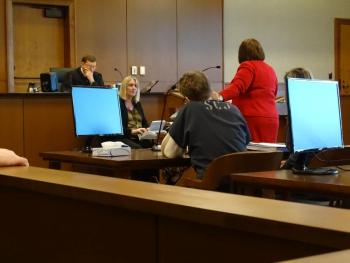 AAG Zainea speaks to Justice Robert Murray. (photo by Erica Thoms)
AAG Zainea speaks to Justice Robert Murray. (photo by Erica Thoms)
 Members of Sharon’s family came to offer their support at the Feb. 21, sentencing. (photo by Erica Thoms)
Members of Sharon’s family came to offer their support at the Feb. 21, sentencing. (photo by Erica Thoms)
BELFAST — A woman formerly of Stockton Springs has been sentenced to 48 years in prison in Waldo County Superior Court Feb. 21, following her December 18 conviction for the murder of her then-10-year-old daughter.
Sharon Carrillo, who is now going by her maiden name of Kennedy, 34, and her then-husband Julio Carrillo, 53, were both charged with depraved indifference murder in the prolonged beating death of Sharon’s daughter Marissa Kennedy, who died Feb. 25, 2018. According to Maine State Chief Medical Examiner Dr. Mark Flomenbaum, who testified during Sharon’s trial, Marissa’s died as a result of Battered Child Syndrome following months of sustained abuse, which included being beaten almost daily.
An annulment of the marriage between Sharon and Julio was granted Dec. 20, with the judge’s finding that the marriage was invalid since Julio Carrillo was still technically married at the time.
While Julio Carrillo received a 55-year sentence after electing to plead guilty in late August, Sharon Carrillo was tried in front of a jury. The trial, which lasted from Dec. 6-18, saw dozens of witnesses testify on behalf of the State.
During the start of the sentencing hearing, statements were read by both defense attorneys and prosecutors before victim impact statements began. Sharon’s relatives read a number of letters of support on Sharon’s behalf, reminding those present of Sharon’s intellectual disabilities, which her family said made her function at the level of a 10-year-old.
In comments made before Sharon’s sentence was pronounced Chief Justice Robert Murray told those in attendance some of the things he took into consideration when determining the proper sentence, including letters written by both prosecutors and defense attorneys, in addition to letters written in support of Sharon Kennedy by members of her immediate and extended family, some of whom attended the sentencing. Murray reminded the court that the evidence presented during Sharon’s trial was also taken into consideration.
“Finally, I have the law, which dictates the process that this court, Maine Court, must utilize to impose a criminal sentence in a case,” Murray said. “That part has been alluded to here today, by both attorneys during their presentation, and it involves a two-step process in a case involved with the charge of murder.
“First, the actual conduct itself, in an objective fashion determining how this particular crime was committed by this defendant and secondly, the sentence step. There is a consideration of comparative factors that are particular to this particular defendant which might warrant or justify some kind of adjustment to that initial sentence imposed for the first step in the process.
“The evidence in this case, during the course of the trial, was significant, and there was ample evidence presented over the course of the trial that supported the jury’s verdict of guilty of depraved indifference murder as it relates to this defendant. There was ample evidence in support of that guilty verdict,” Justice Murray continued.
“Based upon her guilt as a principal factor or as an accomplice, this defendant was an active participant in the depraved indifference murder of Marissa Kennedy. This defendant’s own words, demonstrated her complicity in this crime, and that complicity was not a motive, merely to facilitate her co-defendant’s beating Marissa Kennedy or her coverup, or her failure to report the brutal injuries that her daughter had sustained to people or authorities who may have been able to do something to stop the violence.
“This defendant confessed over the course of a number of hours of interviews. In her own words, she said, “we beat her to death. I should have never done it. I should have just talked to her and not beat my own child.
“Numerous times, over the course of those interviews, over the course of days, she repeatedly said, over and over again, “I should have stopped it. I should have stopped. I should have stopped.” She didn’t say “I should have stopped him,” she didn’t say, “I should have gotten help for Marissa,” she didn’t even say, “We should have stopped,” she said, “I should have stopped.”
Justice Murray called back the heartbreaking words Marissa said to her mother prior to her death: “[Sharon] described Marissa’s own words to her directly, “it feels like I’m dying.” She told the officers specifically how she participated in these beating sessions. Perhaps equally as important….she told the officers, specifically what she could not do during those beating sessions.”
Murray recalled some of the specific abuse Marissa was forced to endure until her body could simply endure no more.
“Over the course of three months and perhaps longer, prior to [her] Feb. 25 death, the day of Marissa’s death, 10-year-old Marissa Kennedy was subjected to almost daily beatings….she was made to kneel naked on the tile floor, with her hands raised above her head. This defendant,” Murray said, looking directly at Sharon while repeating, “this defendant, using her hands, using a belt…. Proceeded to beat Marissa in the head, the arms, her torso, her legs, that’s the information that [was] presented to this court and the jury, from the words of this defendant herself.”
In addition to Sharon’s own words, Justice Murray said the Court can analyze the way in which this crime was committed.
“The Court was presented with evidence by State Medical Examiner Dr. Mark Flomenbaum as to what this conduct did [to Marissa], what was the effect of this long course of brutality to Marissa Kennedy,” Murray said.
“The ME described this as Battered Child Syndrome, as the cause of Marissa Kennedy’s death.”
Murray alluded to statements made by prosecutors earlier in the day of the effect that punishment, that beating, had on Marissa Kennedy. Specifically, that testimony described, “40-50 individual soft tissue traumatic lesions on Marissa’s body, they identified three fractured ribs, blunt trauma to Marissa’s head, leading to hemorrhaging of the brain, it describes a lot of trauma to Marissa’s torso. It described the laceration to Marissa’s liver, and abrasions to her knees and the insteps of her foot…eroding skin to the point of infections, exposed lesions. The ME described objective evidence of chronic stress, intense pain, and also described the fear of impending pain was able to be determined physiologically by what was happening in Marissa’s own life.”
The medical examiner testified that bald patches on Marissa’s head were a direct effect of the abuse she was suffering.
While on the stand Dr. Flomenbaum talked about the release of catecholamines, which is an adrenaline release resulting from each of the incidents. With chronic stress, which was evident by Marissa’s hair loss, the thymus is unable to keep up the production of the catecholamines, leading the thymus to shrivel, Murray told the court.
The ME’s testimony indicated that Marissa’s heart was the ultimate target for her catecholamine response. The catecholamines are released by the thymus in stressful situations, however, if the trauma is chronic, the thymus is unable to replenish its supplies. According to Justice Murray, acute catecholamine myotoxicity is the scientific description for what led to Marissa’s heart failing.
“That’s the crime that was committed here. That’s the crime that the defendant was a participant in.”
Justice Murray said, the law, nonetheless, requires not just an examination of what happened to Marissa, but an individualized assessment of this defendant’s involvement in that criminal act.
“Despite the fact that Marissa suffered and experienced the events I just described, it is this defendant’s involvement that must be analyzed. So again, although the evidence fully supported the jury’s conclusion that this defendant is guilty of the charge of depraved indifference murder, the evidence also supports the conclusion that this defendant’s role, this defendant’s level of engagement in the administration of the beatings I just described, was on a comparative basis, less egregious than her codefendant or her fellow perpetrator. The evidence indicates that this defendant did not use what this court believes to be a significant weapon of torture; a metal bar that was identified during the trial.
“This defendant did not engage in the kicking of the victim, Marissa. This defendant, the evidence presented through the course of the trial, did not demonstrate the level of planning and premeditation as that of her co-perpetrator, Julio Carrillo, demonstrated by his prior announcements of Marissa’s death, quote-unquote, prior to her actual death is chilling and haunting; a prediction four days prior to Marissa’s demise. This defendant’s involvement in a great effort to a coverup is what this court believes constituted a lesser degree of involvement than by that of her co-perpetrator,” Murray said.
“Because of the requirement for an individualized sentence, the Court must go through that two-step analysis, as it relates to this defendant’s conduct,” Roberts said, before going on to explain to the two-step process undertaken in the case against Sharon. This included attention paid to her intellectual disabilities, which make her more susceptible to manipulation.
Murray quoted a letter of support read at the start of the sentencing, where Jerry Roy told Justice Murray, “This defendant adapted her behaviors to whoever she was with,” an assessment Murray said he found to be “particularly accurate from what I have seen in terms of the evidence.”
Murray said the limitation has tended to leave this defendant “prone to manipulation, adaptation, to those she has come into contact with. That is something that affects what this court feels should be an appropriate consideration, mitigation, in terms of the ultimate sentence to be imposed.
“That limitation, as it relates to the intellectual capacities and functioning of this crime is something distinct and different from the issues that have been discussed in many aspects over the course of this case related to domestic violence. There certainly has been evidence in this case, throughout this case, that there was domestic violence in the relationship between this defendant, and co-defendant Julio Carrillo. That evidence of domestic violence was especially corroborated by independent observations, especially while the parties lived in Bangor, a place where this behavior was observed.
“Having said that, however, this court concludes that that evidence, particularly with respect to the domestic violence component is not persuasive in regard to any argument that this defendant was committing the crimes she was committing against Marissa as a result of physical domestic violence that may have been inflicted on her at some times, like Julio Carrillo. That is not a mitigating factor I’m alluding to. The mitigating factor focuses on what has been described as limited intellectual capacities function and how that has impacted this particular defendant.
“Finally, one other mitigating factor that I think is apparent in this case, is that there is, in this Court’s eyes, a low likelihood of reoffense by this defendant upon release.”
Murray went on to say that the “mitigating factors in the case “somewhat outweigh the aggravating factors, [though] not by a significant margin.”
With this in mind, Murray said that in the Court’s eyes, the balance justifies “an adjustment of the basic sentence of 50 years to a maximum sentence of 48 years of incarceration.
“For the reasons articulated, this Court imposes a sentence of a period of 48 years of incarceration at the Department of Corrections.” Murray also ordered Sharon to pay $6,900 restitution to the State in regard to expenses they incurred over the trial.
During the nine-day trial, which was held in mid-December, Sharon Kennedy (Carrillo) and her attorneys argued that Sharon was a victim of Julio Carrillo and not a participant in the abuse against her daughter. It is a claim Sharon made and has maintained since shortly after her two interrogations with Maine State Police detectives the day of and after Marissa’s death.
Over the course of the nine-day trial, jurors were shown hours of videotaped interviews between Sharon and law enforcement conducted the day Marissa was found and the following day. Graphic photos cataloging Marissa’s abuse, including autopsy photos were also shown to the jury, along with several videos recorded by Julio.
It took jurors roughly five hours to reach their verdict.
In statements made after the sentence was handed down, Assistant Attorney General Leane Zainea refused to say whether she was pleased with the verdict or not, despite originally seeking a life sentence. Sharon’s Attorney Laura Shaw told reporters she and co-counsel Christopher MacLean plan to appeal Sharon’s conviction.
Erica Thoms can be reached at news@penbaypilot.com
Event Date
Address
United States




